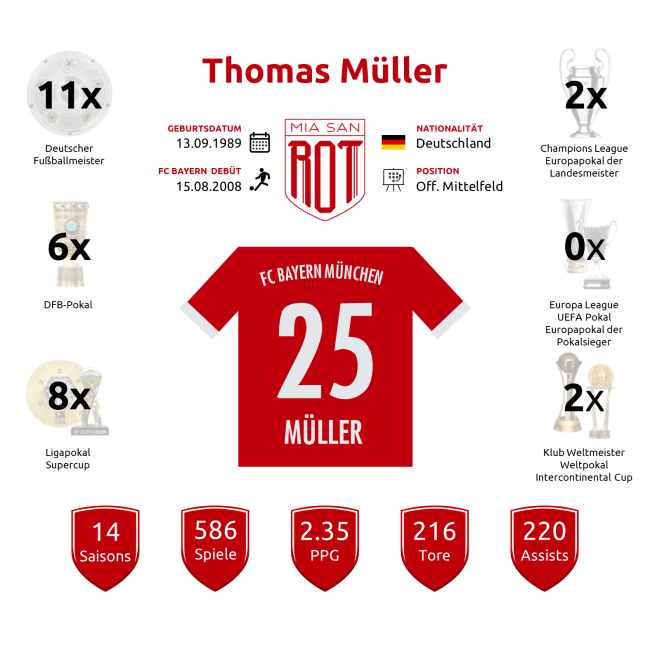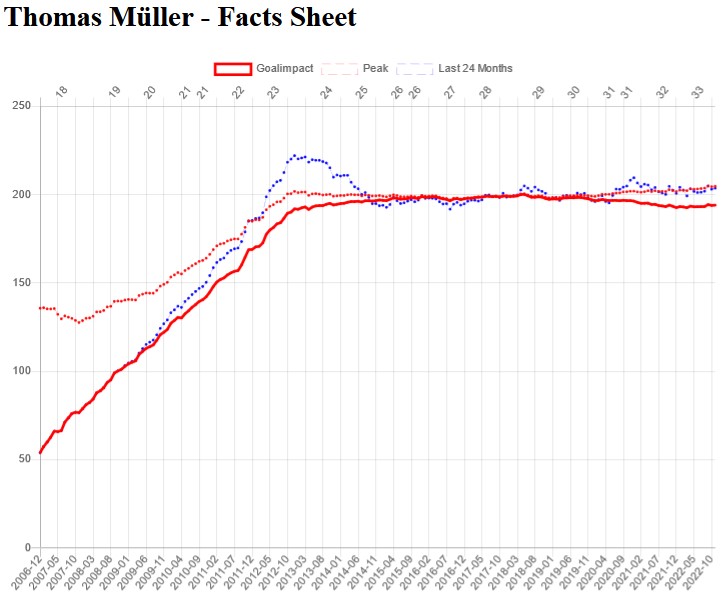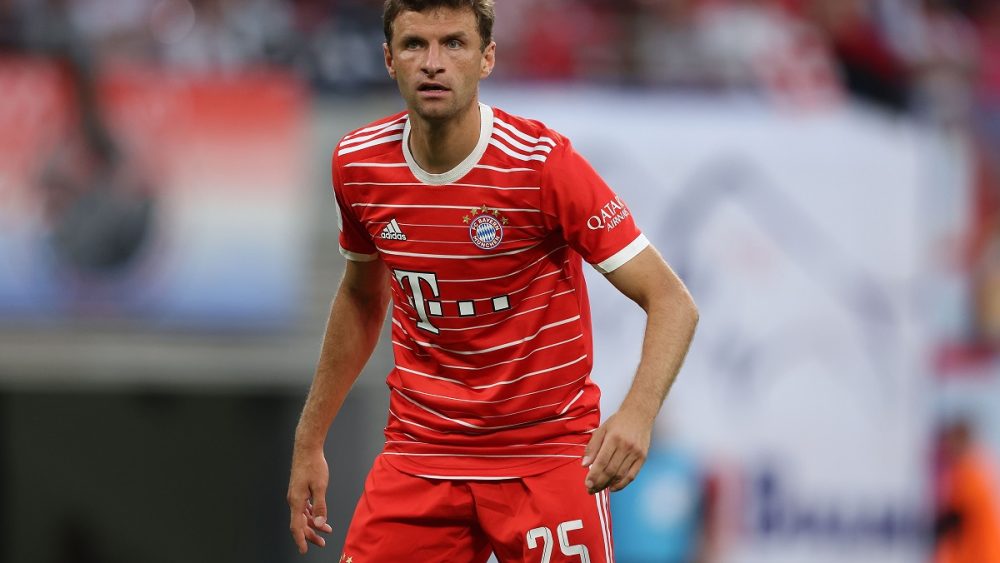FC Bayern – Miasanrot Advent Calendar, Door 25: Thomas Müller
A guest article by Patrick May
Louis van Gaal is considered to be the discoverer of Thomas Müller. When the Netherlands met Germany last, in March 2022, the Bonds coach once again heaped high praise on his former protégé by calling him the “ideal player for every coach.”
And indeed, Müller has been a permanent fixture of the Bayern team under every coach except Niko Kovac. Perhaps not coincidentally, there are parallels to the current disagreement between the now Wolfsburg coach and Max Kruse. We will discuss why Kovac is perhaps the exception to van Gaal’s rule. But to do so, we must first describe the player Thomas Müller – or we must ask:
What is an “ideal” player?
To answer that, let’s take a short detour to Einstein and physics.

Müller the astronaut in and Taylorian space-time
“In football, time and space are the same thing.” – Graham Taylor
Talyor, one of England’s coaching legends, spliced space and time together in football with this statement, as Einstein once did with “real” time and space.
But what did he mean by that?
Space and time are the most important variables for successful football. The more space or time a player has on the field (not only physically but also cognitively), the higher the probability of using the ball effectively. In addition, the statistically most important spaces are those close to the goal because the goals (more likely) fall from within or near the boxes. So not every space is equally valuable if you want to win a game. That’s why players and coaches try to influence the football space-time with their decisions, even if they don’t always know it consciously. Players who are good at this can be called ideal.
So much for physics, Einstein, and football – but where is the connection to Thomas Müller?
Müller calls himself a “space interpreter”. Based on the above line of thought, I would like to elevate Müller a little higher in the football pantheon and call him a “space-time interpreter” because Thomas Müller marks the apogee of the interpretation of space and time. There is hardly a player whose game intelligence influences these two factors as constructively for his team as Müller does.
How does Müller do it? Martin Rafelt summarized Müller’s principles in a great article, “How to interpret space” for the German football blog Spielverlagerung:
– always offer a good passing option
– tie up as many opposing players as possible
– never reduce the space of your players
– run routes that create 2 vs. 1 superiority
– always play goal-oriented if possible
(Defensively, these principles can be inverted – Müller is also very good at this).
Thomas Müller is therefore guided by higher principles. He thus enables his team to get into better spaces and have more time there. However, since these principles are executed flexibly, Thomas Müller breaks out of rigid tactical guidelines and dynamics. This is his nature. Martin Rafelt has therefore judged Müller’s movements to be highly logical, even though they may seem absolutely unconventional and sometimes even contrary to the tactical guidelines. He prefers to do the right thing rather than the expected, and while closely sticking to his principles, his moment-to-moment execution is maximally free.
This paradox-sounding style of play also brings us back to Kovac.
Kovac and Müller – two repulsive poles
If you force the free spirit Müller into a rigid tactical construct, he cannot release his full footballing potential. But Müller doesn’t allow himself to be pressed into a concept either. Perhaps this also explains why Kovac was not a fan of Müller. For coach Kovac, clear and disciplined processes on the pitch are essential. Kovac tends to perfect certain game sequences rather than adjusting to dynamics situationally and intuitively.
Müllers’ nature resists this authoritarian leadership (like Max Kruse’s). His free footballing mind governs his play according to higher principles and not according to the rigid expectations of the coach. While the opponent can always adjust to a tactical plan, principles can be flexibly adapted to any game situation. This makes Müller the incarnation of the idea of evolution – permanently adapting to the game situation. My provocative hypothesis is, therefore, that Müller is a better coach on the field than Kovac is off the field.
Is that just my opinion?

No, not only. According to us at Goalimpact, Thomas Müller is one of the best players of all time. With a peak Goalimpact of 205, he is better than Messi and Ronaldo. What is most remarkable is that Müller is probably the most consistent world-class player of all time. He hasn’t had a period in the last 11 years where he didn’t have a Goalimpact of over 190. That’s scary good but makes sense when you illuminate his game intelligence and adaptability.
Thomas Müller is doing the right thing – the “ideal” player, even if it looks unusual at times.









